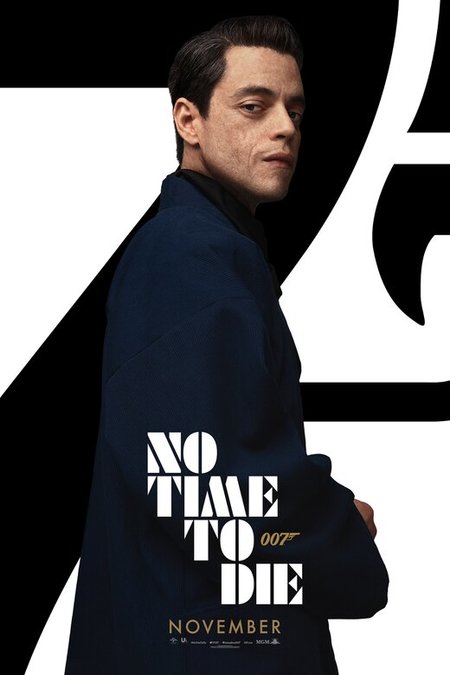Farewells are never the easiest of things to pull off.
So much emotional baggage, so much pressure to make them count and be memorable in all the right ways and a host of jagged loose ends to tie up, the kind that don’t always lend themselves to neat and tidy arrangements.
When it came to making No Time to Die, the last Daniel Craig-centred entry in the venerable Bond franchise (he has been in the Aston Martin hot seat for 15 impressive, tuxedo-wearing years), an appreciation of the many complexities of saying goodbye were no doubt uppermost in the mind, with all them clearly obvious in a film which seamlessly brings together the bombastic Bond escapism of old with some gut-wrenching, heart-stopping emotional impact.
This is a film that knows we want physics-defying car chases through the narrow streets of stone-built European villages, that understands we crave set locations around the world, filled with impossibly lavish parties, acts of barbarous terrorism and balletically intense payback, and that appreciates that Bond is all swagger, bravado and determined action.
But in keeping the interconnected films of the Craig era, which have a continuity that the older instalments in the franchise never sought to engender, happy in their standalone status, we have become accustomed to the heart of Bond being worn front and centre on his immaculately-tailored sleeve, his festering wounds evident for all to see despite the gruff masculinity which is part and parcel of the character.
So, it is that No Time to Die sees Bond grappling with major life changes, whether it’s relationship issues with psychiatrist partner Dr. Madeleine Swann (Léa Seydoux), with whom he ended up after 2015’s SPECTRE, caused by explosive forces that are not what they seem, or dealing with the fact that the very thing he wants, has always wanted from life, may yet slip through his fingers just when it is almost within his grasp.
He undergoes an intense emotional journey in No Time to Die that easily makes this the most emotionally resonant entry in the canon since 2012’s Skyfall, the devastating final scenes of which might have seemed at the time as the last word in the tortured story that is Bond, James Bond.
No Time to Die knocks this idea well out of the expansive park that is Bond’s global universe, offering up an achingly poignant story of one man’s quest to exorcise his demons, not simply by taking on evil and villainy wherever he finds it, but by coming to grips by what made him who he is in the first place.
Or at least, by getting to the bottom of what he could become if he only lets himself go down that road.
At various times, we see Bond racing to embrace this possible future as he sits back in retirement, fishing, relaxing and doing his best to pretend the persistent, and frankly quite mental, evils of the outside world will leave him alone.
That is not to be, of course, because for all the deep diving into Bond’s oft-wretched times wretched but hopeful soul, No Time to Die, it is also first and foremost a spy drama with melodramatic leanings, all of find searing expression in the person of the Villain du Jour Lyutsifer Safin (Rami Malik) whose pockmarked face provides physical evidence of past pain so great it can easily compete with that melancholily swimming through the veins of Bond and Swann.
It is what he chooses to do with his great and terrible pain that gives No Time to Die its traditionally blockbuster-y narrative core, embarking on the kind of the kind of world-ending horrors-in-the-marking for which the franchise is renowned.
He is, in many ways an traditional Bond baddy, resourced with money, manpower and mania in abundance, but while he has all the hallmarks of over-explaining villains of old, he also comes with some real emotional darkness, the kind that distorts and twists the soul to such a dehumanising degree that there is very little that is recognisably human left in place.
His showdown with Bond towards the end of the film of an island in disputed waters between Russia and Japan, is not the simply the stuff of ye olde Bond adventures for it comes with a soul-searing exploration of what pain can do to a person, with one choosing oblivion and death and the other a certain desperate nobleness that doesn’t come with a guaranteed happy ending but must be undertaken anyway.
There are no prizes for guessing who is who in that scenario; the main takeaway from a final act which is equal parts broken, fallen, immeasurably humanity and blustering bravado is that Bond, the franchise, has found its heart, put it on its sleeve and isn’t afraid to let anyone know it is there.
No Time to Die is flawed in certain entirely un-fatal ways, choosing, perhaps understandably – remember again that farewells are not easy to do nor simple to endure – to try to do too much in its 163-minute running time, but by and large it is exactly the time of goodbye that Craig’s anguished take on the character demands and deserves.
We are given the globe-trotting locales, the breathtakingly lush and lavish set pieces and the titanic battle between good and evil, all marred by traces of each other so neither is as cleancut or pure as our morality tale-loving souls are craving; we are also able to spend time with the likes of M (Ralph Fiennes), Moneypenny (Naomie Harris), Q (Ben Whishaw) and the new 007 (Bond has retired and so she gets the number and the gig) Nomi (Lashana Lynch), who sports a fine line in funky sunglasses and seamless capability, who all play their parts in giving Bond the send off he deserves.
These all boxes that need to be ticked, and have to be if No Time to Die is to do its unenviable job of farewelling an era, but far more than that, the film recognises that we can’t just have these elements, richly delivered as they are and be done with it.
We need to feel something, something deep and epoch-ending, and the film delivers that in spades, offering up a dark night of the soul, and then a nascent dawn which does not reach full daylight in quite the way you might expect.
Quite how it finally says goodbye is the stuff of spoilers so intense and unspeakable that they are worthy of being kept secret without a sliver of knowledge escaping, but suffice to say that while you will be enthralled, inspired, alive and engrossed in exactly the kinds of ways that Bond films have always excelled, you will also have your heart ripped in ways that feel fitting for a character who has always worn his suffering and pain like an extra layer of soul-sapping armour.
As farewells go, No Time to Die is impressive bringing together the two Daniel Craig-era parts of the Bond whole – the epic, gigantic narrative battle between melodramatic evil and flawed good and the fragile vulnerability of a broken soul seeking solace and healing though not without missteps – and giving the audience the kind of farewell of which many of us can only dream, flawed at times, and intimately human but fully rounded and truthful in ways that make you sorrowful for what has been lost but quietly hopeful of what may lie ahead in a whole new world that will look nothing like the one that preceded it.


